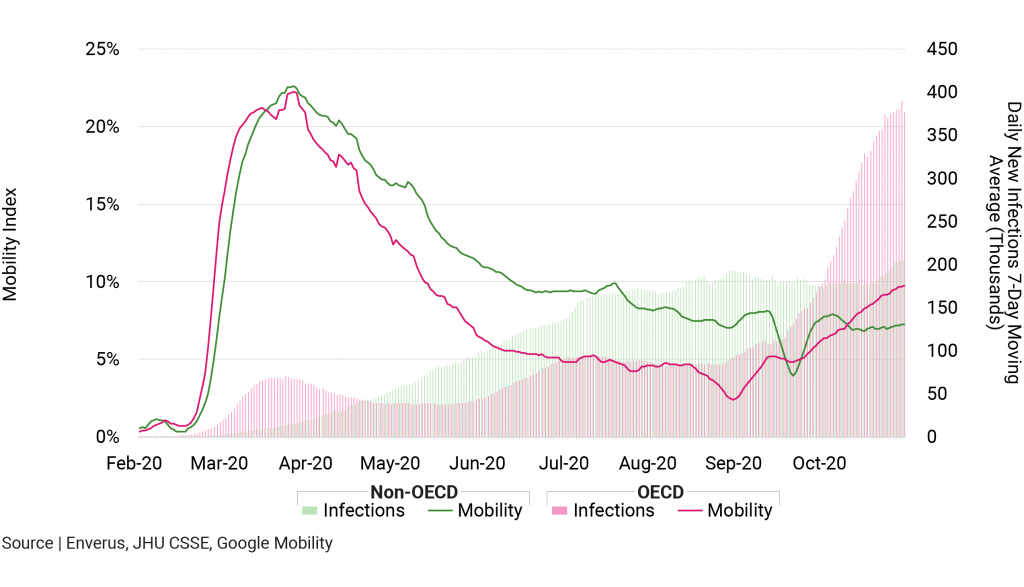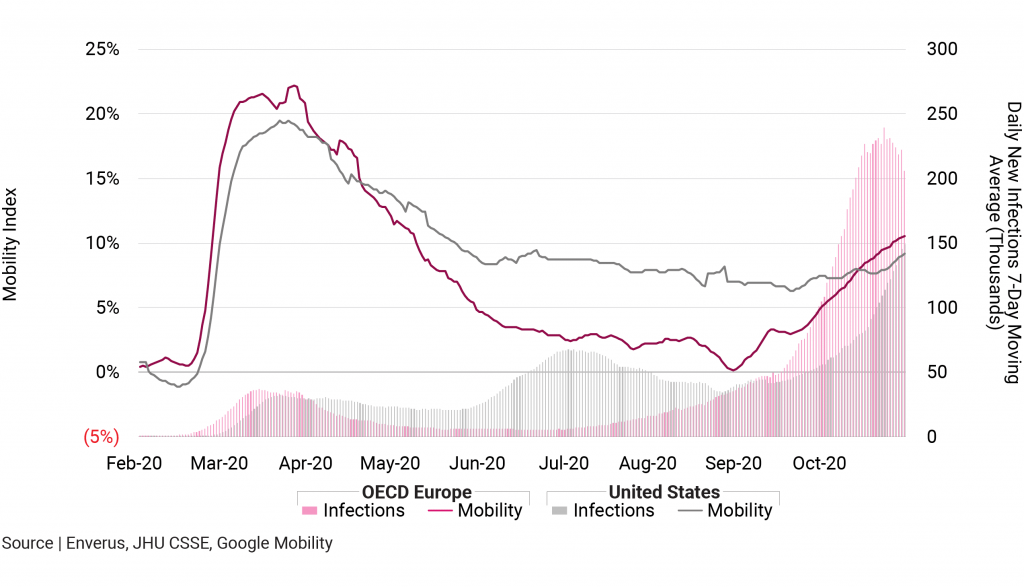With the recent surge in COVID-19 infections across much of the developed world, policymakers have started to re-introduce lockdown measures to control the spread. These efforts often restrict the movement of people in public spaces, reducing close contact to one another. France is currently under a national lockdown where people are only permitted to go to work, buy essential goods like groceries or seek medical help; restaurants and bars remain closed. The U.S. has not implemented a national lockdown but many state governments, including California, Oregon, Washington and Michigan, have shut down indoor dining among other measures. The implications of lockdowns on oil demand are clear: if sustained and widespread, fewer people will be driving and therefore consuming less gasoline and diesel.
Figure 1 shows daily COVID-19 infections rates along with residential mobility in OECD and non-OECD countries. Residential mobility is one of Google’s six mobility indicators but unlike the other five, which show changes in the number of visits to parks, transit stations, retail outlets, etc. relative to pre-pandemic levels, this indicator shows how time spent at home has changed. Since the start of October, COVID-19 infections increased by nearly 300,000 cases per day in OECD countries; governments responded by gradually introducing restrictions. With greater lockdowns, residential mobility has increased as people stay home. Figure 2 compares the U.S. to OECD European countries. The U.S. is in a third wave of COVID-19 infections and residential mobility is beginning to trend upwards as governors try to curb the spread of infections in their states by imposing lockdown measures. We will be monitoring Infection rates and containment measures worldwide in coming weeks.
FIGURE 1 | COVID-19 Infections and Mobility in OECD and Non-OECD Countries

FIGURE 2 | COVID-19 Infections and Mobility in OECD Europe and US

RS Energy Group Disclosure Statement:
© Copyright 2020 RS Energy Group Canada, Inc. (RSEG). All rights reserved.
All trademarks, service marks and logos used in this document are proprietary to RSEG. This document should not be copied, distributed or reproduced, in whole or in part. The material presented is provided for information purposes only and is not to be used or considered as a recommendation to buy, hold or sell any securities or other financial instruments. Information contained herein has been compiled by RSEG and prepared from various public and industry sources that we believe to be reliable, but no representation or warranty, expressed or implied is made by RSEG, its affiliates or any other person as to the accuracy or completeness of the information. Such information is provided with the expectation that it will be viewed as part of a mosaic of analysis and should not be relied upon on a stand-alone basis. Any opinions expressed herein reflect the judgment of RSEG as of the date of this document and are subject to change at any time as new or additional data and information is received and analyzed. RSEG undertakes no duty to update this information, or to provide supplemental information to anyone viewing this material. To the full extent provided by law, neither RSEG nor any of its affiliates, nor any other person accepts any liability whatsoever for any direct or consequential loss arising from any use of the information contained herein. The recipient assumes all risks and liability with regard to any use or application of the data included herein.
Caution Regarding Forward-Looking Statements:
This public communication may contain forward-looking statements within the meaning of the Securities Act of 1933, as amended, and the Securities Exchange Act of 1934, as amended. These statements are based on our current expectations about future events or future financial performance. In this context, forward-looking statements often contain words such as “expect,” “anticipate,” “intend,” “plan,” “believe,” “seek,” “see,” “will,” “would,” or “target” or other words that convey uncertainty of future events or outcomes.
These statements involve known and unknown risks and uncertainties that may cause the events we discuss not to occur or to differ significantly from what we expect. When evaluating the information included in this communication, you are cautioned not to place undue reliance on these forward-looking statements, which reflect our judgment only as of the date hereof. We undertake no obligation to publicly revise or update these forward-looking statements to reflect events and circumstances that arise after the date hereof.
Note to UK Persons:
RSEG is not an authorised person as defined in the UK’s Financial Services and Markets Act 2000 (“FSMA”) and the content of this report has not been approved by such an authorised person. You will accordingly not be able to rely upon most of the rules made under FSMA for the protection of clients of financial services businesses, and you will not have the benefit of the UK’s Financial Services Compensation Scheme. This document is only directed at (a) persons who have professional experience in matters relating to investments (being ‘investment professionals’ within the meaning of Article 19(5) of the Financial Services and Markets Act 2000 (Financial Promotion) Order 2005 (the “FPO”)), and (b) High net worth companies, trusts etc of a type described in Article 49(2) of the FPO (all such persons being “relevant persons”). RSEG’s services are available only to relevant persons and will be engaged in only with relevant persons. This report must not be acted or relied upon by persons who are not relevant persons. Persons of a type described in Article 49(2) of the FPO comprise (a) any body corporate which has, or which is a member of the same group as an undertaking which has, a called up share capital or net assets of not less than ( i ) in the case of a body corporate which has more than 20 members or is a subsidiary undertaking of an undertaking which has more than 20 members, £500,000 and (ii) in any other case, £5 million, (b) any unincorporated association or partnership which has net assets of not less than £5 million, (c) the trustee of a high value trust within the meaning of Article 49(6) of the FPO and (d) any person (‘A’) whilst acting in the capacity of director, officer or employee of a person (‘B’) falling within any of (a), (b) or (c) above where A’s responsibilities, when acting in that capacity, involve him in B’s engaging in investment activity.